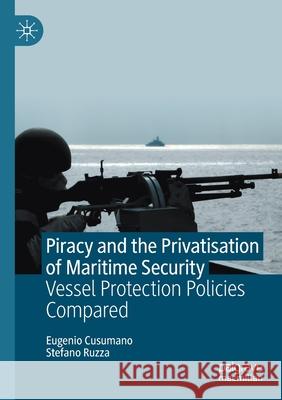Piracy and the Privatisation of Maritime Security: Vessel Protection Policies Compared » książka



Piracy and the Privatisation of Maritime Security: Vessel Protection Policies Compared
ISBN-13: 9783030501587 / Angielski / Miękka / 2021 / 286 str.
Piracy and the Privatisation of Maritime Security: Vessel Protection Policies Compared
ISBN-13: 9783030501587 / Angielski / Miękka / 2021 / 286 str.
(netto: 498,38 VAT: 5%)
Najniższa cena z 30 dni: 501,19
ok. 16-18 dni roboczych.
Darmowa dostawa!
1 Introduction: protecting merchant vessels from pirates
1.1 Why this book
1.2 Vessel protection and security studies: the state of the art
1.3 Research design and methodology
1.4 Structure of the book
2 Piracy and counter-piracy in the Twenty-first century
2.1 Piracy: from the ‘golden age’ to the present2.2 Contemporary piracy in comparison: Southeast Asia, Gulf of Guinea and Gulf of Aden
2.3 Piracy off the Horn of Africa
2.4 The response of the international community: global counter-piracy naval missions
2.5 The response of the shipping industry: the Best Management Practices and the use of armed teams
2.6 The regulation of the maritime private security industry
2.7 Conclusions: the rise of Somali piracy and of onboard armed protection
3 From divergence to isomorphism in vessel protection policy: a theoretical framework
3.1 The dynamics of institutional isomorphism
3.2 Isomorphism in International Relations
3.3 The limits of isomorphism in international security
3.4 The drivers of security privatisation
3.4.1 Functionalist perspectives
3.4.2 Ideational perspectives
3.4.3 Political perspectives
3.4.4 Organisational perspectives
3.5 Analytical eclecticism, foreign policy analysis, and security privatisation: a sequential approach
3.6 Conclusions: towards a multicausal explanation of vessel protection
4 Privateers versus pirates? The United Kingdom case
4.1 British shipping and the threat of piracy
4.2 Private actors in British national security
4.3 The process that led to the 2011 Interim Guidance
4.4 The contents of the Interim Guidance
4.5 After 2011: Britain keeps the course
4.6 Conclusions: the resilience of British commercial vessel protection
5 Vessel protection in the Netherlands: a belated commercialisation?
5.1 Dutch shipping and the threat of piracy
5.2 Private actors in Dutch national security
5.3 Sticking to the monopoly of violence: vessel protection as the preserve of VPDs
5.4 Re-evaluating Dutch vessel protection: from ‘VPDs only’ to a dual model
5.5 The Merchant Shipping Protection Law: a ‘VPDs, unless’ approach?
5.6 Conclusions: a de facto privatisation?
6 From hybrid to commercial vessel protection: the Italian case
6.1 Italian shipping and the threat of piracy
6.2 Private actors in Italian national security
6.3 The process leading to Law 130/2011 and military-only protection
6.4 VPDs under trial: the Enrica Lexie incident
6.5 After the incident: the dual and private-only phases of Law 130/2011
6.6 Conclusion: from VPDs to commercial protection
7 Vessel protection in other European countries
7.1 Shipping and European maritime security: an overview
7.2 Malta
7.3 Greece
7.4 Cyprus
7.5 Norway
7.6 Denmark
7.7 Germany
7.8 France
7.9 Belgium
7.10 Spain
7.11 Conclusions: the commercialisation of European vessel protection
8 Open registries and vessel protection: Panama, Liberia and the Marshall Islands
8.1 Not all flags are equal: the peculiarities of open registries
8.2 Panama: the largest registry
8.3 Liberia: Stettinius’ legacy
8.4 The Marshall Islands: a flag on the rise
8.5 Conclusions: open registries are not all the same
9 Isomorphic convergence in vessel protection
9.1 Vessel protective policies as an isomorphic process
9.2 The limits of isomorphism
9.3 Explaining the commercialisation of vessel protection
9.3.1 Functionalist explanations
9.3.2 Ideational explanations
9.3.3 Political explanations
9.3.4 Organisational explanations
9.4 A sequential explanation of vessel protection
9.4.1 Appraisal of available policy options
9.4.2 Implementation of protective policies
9.4.3 Re-evaluation protective policies
9.5 Conclusions: A synthetic approach to vessel protection
10 Conclusion: vessel protection between private and maritime security studies
10.1 Advancing private security studies
10.2 Advancing maritime security studies
10.3 Commercial vessel protection: exception or precedent?
10.4 Limitations and future research routes
10.5 Final remarks
Eugenio Cusumano is Assistant Professor of International Relations at the University of Leiden, the Netherlands. He wrote extensively on non-state actors’ involvement in crisis management on journals like Security Dialogue and the Journal of Strategic Studies and edited volumes published by Palgrave, Oxford and Stanford University Press.
Stefano Ruzza is Assistant Professor of Political Science at the University of Turin, Italy. He is also a Head of Program at T.wai - Torino World Affairs Institute, lectures in Italian Army advanced educational programmes, and is responsible for the Italian translation of the SIPRI Yearbook Summary.
“An essential reading for anyone interested in the rise of private security at sea and the regulatory challenges arising.”
— Christian Bueger, professor of International Relations, Copenhagen University
“This careful comparative analysis is a timely reminder that authority over the use of force is now located within commercial networks, inviting us to engage with the consequences.”
— Anna Leander, professor of International Relations, Graduate Institute Geneva
“Extensive research and incisive analysis give the book authenticity and credibility, adding an invaluable contribution to fighting piracy and maritime security debates.”
Eugenio Cusumano is Assistant Professor of International Relations at the University of Leiden, the Netherlands. He wrote extensively on non-state actors’ involvement in crisis management on journals like Security Dialogue and the Journal of Strategic Studies and edited volumes published by Palgrave, Oxford and Stanford University Press.
Stefano Ruzza is Assistant Professor of Political Science at the University of Turin, Italy. He is also a Head of Program at T.wai - Torino World Affairs Institute, lectures in Italian Army advanced educational programmes, and is responsible for the Italian translation of the SIPRI Yearbook Summary.
1997-2026 DolnySlask.com Agencja Internetowa
KrainaKsiazek.PL - Księgarnia Internetowa









